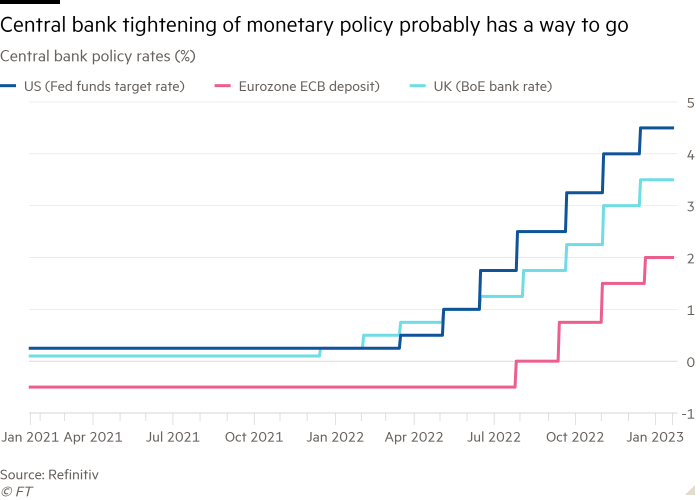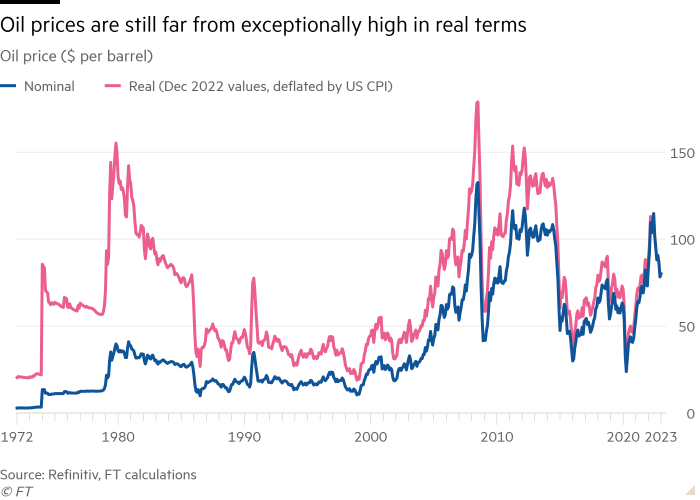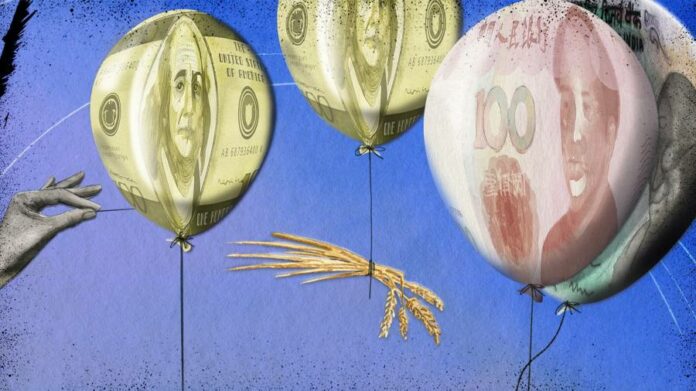One always learns something from the World Economic Forum. At the very least, one learns what rich and powerful people think is happening. They may be wrong: indeed, they often are. The world is, as we have recently been reminded, full of surprises. But here are my reactions.
The businesspeople are feeling more cheerful. Yes, they are still suffering from the legacies of Covid, the inflationary post-pandemic reopening and Russia’s assault on Ukraine. They are still threatened by the hostility between the US and China. But the news has been more positive: Ukraine has been doing better in its fight for survival; the lunatics fared worse than expected in the US midterm elections; gas prices have tumbled; headline inflation may have peaked; recession worries have lifted; and China has reopened.
With that background, let us consider some of the more important topics, starting with the economic outlook.
The general mood on the economy in the high-income countries is one of greater optimism about the near-term future. Yet these optimists may be getting ahead of themselves. The growth of US nominal GDP has been far too fast to be consistent with inflation at 2 per cent. US wages have also grown at close to 5 per cent, over the past year, while unemployment remains low. None of this is consistent with hitting the inflation target on a sustained basis. If one takes the Fed seriously (I do), this implies tighter monetary policy and a weaker economy than many expect. Alternatively, the Fed may give up too soon, only to be forced to tighten again a year or two later. As for the ECB, it is a good bet that it will seek to get inflation back to 2 per cent as soon as possible.
The mood in many developing countries is anxious, however. The legacy of Covid, high food and energy prices, high interest rates and a strong dollar have put many low and lower middle income countries into serious difficulties. The worries of some policymakers, especially those from Africa, were palpable.
The stories coming out of China and India, the world’s giant emerging economies, were rather different. Liu He, the outgoing vice-premier, came to tell participants that China is not just open again, at home and abroad, but is also embracing its private sector. A western businessman I know well, long resident in China, confirmed the shift. A plausible explanation is that Xi Jinping has decided that growth matters. This year, it will clearly be strong. Whether the new approach will be sustained in the longer term is uncertain. That is inevitable when power is so concentrated. The urge for tight control will surely return.

The Indians were the largest delegation in Davos. Their business community is clearly feeling optimistic about the prospects of what may now be the world’s most populous country. Indeed, unless things go wrong (always possible), this should be the fastest growing large economy in the world over the next couple of decades. Opportunities should abound.

Another huge story concerns trade and industrial policy. The misnamed US Inflation Reduction Act is mesmerising European businesses, many of which are considering shifting operations there, partly to exploit its opportunities, but also to take advantage of lower US energy prices. This is the beginning of a subsidy war, one in which the US, with its vast federal budget, has the upper hand, though Ursula von der Leyen, head of the European Commission, proposed possible responses. I have little doubt that these policies will be wasteful. But they should accelerate the introduction of new climate technologies. Economic nationalism may now be the only way to do so. It is also splitting the west at a crucial moment.

Almost as striking was how Katherine Tai, US trade representative, framed US trade policy in terms of worker interests and worker rights. Yet what was most significant was not this, but rather the apparent absence of any US view of how the global trading system should operate. The erstwhile hegemon has not just developed deep suspicions of China, this being the one truly bipartisan policy; it has abandoned interest in the system.
A final area of focus was technology. Temporarily, I fear (and permanently, I hope) the hype over cryptocurrencies has abated. This leaves the field open for the dramatic improvements in global payments systems that central bank digital currencies could deliver. On the environment, the most excitement this time seemed to be on the shift towards hydrogen. That does indeed look like a crucial element in a more environmentally sustainable economy.

The greatest hype, however, was over artificial intelligence. ChatGPT has for the moment stolen the show. The ability of people engaged in AI to feel unabashedly enthusiastic about their creations is as understandable as it is terrifying. The more I watch the creations of the tech industry, the more I fear that I am watching the sorcerer’s apprentice in real life. The difference is that nobody has the ability to turn this spell off.
Finally, very present throughout was the assault on Ukraine. In a breakfast meeting, Boris Johnson was reborn, informing the audience that there was no chance that Vladimir Putin would use nuclear weapons. I hope he is right. But the issue the discussion raised was clear: Putin’s attempt to recreate the Russian empire cannot be allowed to stand. It would make Europe radically and permanently insecure. It would embolden neo-imperialists everywhere. It must be defeated.
In all, the news has indeed been better in recent months. The absence of another huge shock is good news in itself. But many unresolved challenges remain, not least finding a swift and successful end to the war and getting to grips with climate change. Things may be a bit better. They are far from good.






